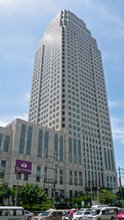The Bangkok property market remains in line with overall Asia-Pacific trends, according to the latest Jones Lang LaSalle Asia-Pacific property digest.
This is in spite of a softening market outlook due to political and economic uncertainty, said Thailand managing director Suphin Mechuchep.
The digest reported robust Asia-Pacific growth was fuelling new businesses and corporate expansion in key markets, which had seen big rent increases, rising wages, and a growing middle class in emerging markets underpinning the retail market.
Thailand's strong market fundamentals mean rents continue to rise in the office and retail sectors, although at a slower pace, the digest said. The Bangkok property market will likely regain momentum in 2008 if political dust settles following a general election planned for this December.
In the region, robust economic growth is driving demand for office space. The bulk of recent leases have been for finance, insurance, real estate and business support service companies.
Demand from banking and fund-management companies is strong in the financial centres of Hong Kong, Singapore, Sydney and Tokyo, resulting in some markets posting the best rents in 20 years.
"Rents are likely to stay buoyant with new supply low in the short term," Jones Lang LaSalle head of Asia-Pacific research Jane Murray said.
This is prompting some companies to relocate non-core operations to more affordable locations. This is the case in Hong Kong and Singapore, where the company noted an increasing level of leasing activity in fringe areas and industrial properties, Murray said.
In addition to the trend of relocating non-core operations to contain costs, strong exports from Japan, South Korea, China and many of the Southeast Asian countries have contributed to a revival in the industrial segment, particularly for hi-tech space and logistics centres.
On the investment front, the global appetite for real estate assets remains exceptionally strong. Factors driving this demand include significant growth in retirement savings, increased allocations to real estate by institutions, improving real estate transparency and large balance of payment surpluses of energy and commodity exporting nations.
Global investment in direct commercial real estate reached US$682 billion (Bt236 trillion) last year, up 38 per cent on 2005 and nearly double 2003 volume, according to a March Jones Lang LaSalle report called "Global Real Estate Capital: Moving Further and Faster".
In Asia Pacific, investment totaled $94 billion in 2006, an annual increase of 42 per cent. The investment hot spot of Japan dominated with transaction volumes surging 128 per cent and accounting for 55 per cent of regional investment.
Transactions in China rose a hefty 69 per cent to $9 billion, despite government measures to cool the real estate market.
Healthy economic and property-market fundamentals will ensure investor demand remains strong in 2007. Pricing pressures are likely to intensify with many funds increasing their weightings in Asia.
Strong competition in tier-one markets is resulting in some investors moving further afield to tier two and tier-three locations in search of superior risk adjusted returns.
Investor demand will remain unabated in 2007 on the back of attractive economic and property-market fundamentals and increased institutional weightings to real estate, Murray said.


No comments:
Post a Comment